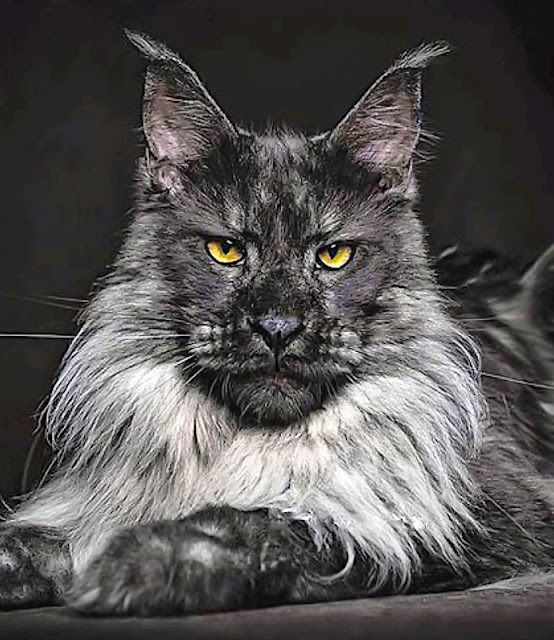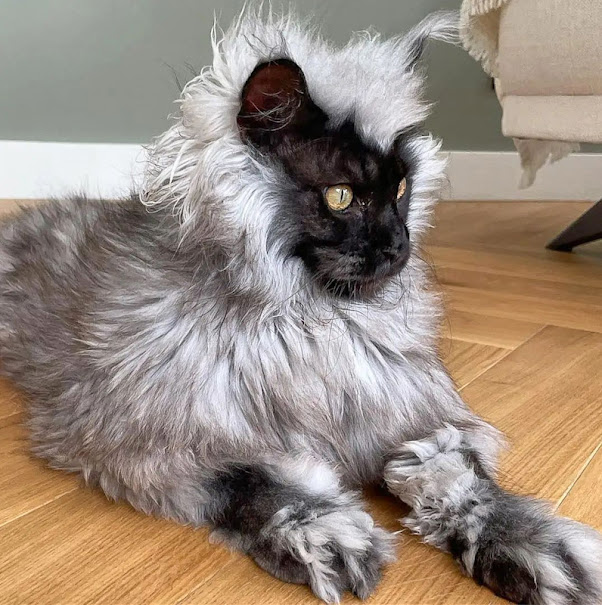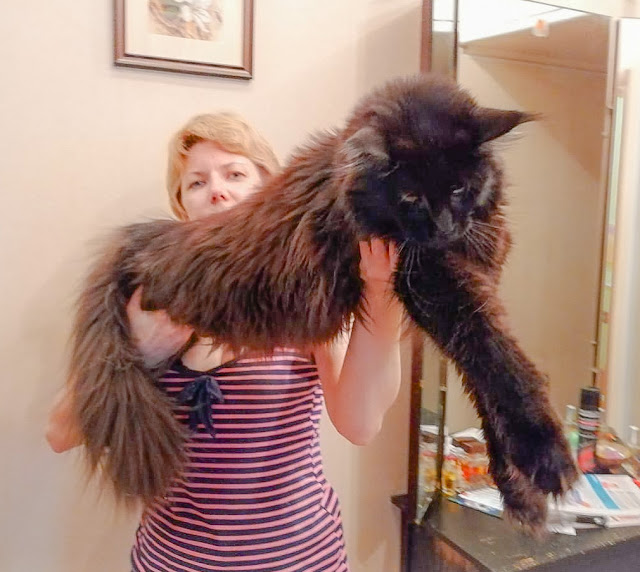Maine Coon cats and diabetes mellitus a.k.a. Type II diabetes
Maine Coon cat caregivers who are really switched on and concerned about their cat's health might want to know a little bit more about diabetes mellitus which can affect domestic cats including the Maine Coon cat. It is not a disease which is directly inherited but which is the result of a lifestyle in much the same way that it affects humans. It is rare.
Dry cat food
Notwithstanding that statement, some cats are probably genetically predisposed to getting Type II diabetes. One well-known veterinarian who wrote a book called YOUR CAT, Elizabeth M Hodgkins DVM, believe that being overweight in cat is not a cause of diabetes mellitus. She argues that a cat contracting Type II diabetes and being overweight has a common cause; a root cause. And that cause, she believes, is dry cat food which is high in carbohydrates.
She believes cats on dry cat food are predispose to hypoglycaemia and she has treated diabetic cats with wet cat food and nothing else and they have entered into remission with respect to their diabetes. So a concerned cat caregiver should think about diet and move away from an exclusively dry cat food to one which is primarily wet and of a high quality with some dry for perhaps night-time grazing.
Obesity
Taking a more conventional view, and in reference to humans, obesity is considered to be one of the primary risk factors for feline diabetes. And turning once again to humans, it is a known fact that when overweight humans reduce their weight even not substantially their Type II diabetes goes into remission. There is a distinct link between obesity and diabetes if one looks at humans. Note: human physiology and anatomy is very similar to that of domestic cats.
And so, we can say with some confidence that overweight or obese cats have a higher likelihood of developing insulin resistance a condition in which the body's cells become less responsive to the effects of insulin which causes high blood sugar levels which is diabetes mellitus. High blood sugar levels can lead to permanent damage of the nerves the most distant from the centre of the body which is called peripheral neuropathy. In fact, diabetes has many negative impacts on a cat's and human's health.
Insulin injections
It is possible to treat feline diabetes in the same way that one treat human diabetes by taking insulin injections. And there are cat owners who do deliver to their cats insulin injections on a regular basis in order to cope with feline diabetes. It's rare but it happens.
A list of possible causes
Diet: I'm referring here to how diet and the quality of a cat's diet can play a role in the development of diabetes mellitus. A high carbohydrate diet and low in protein can increase the risk. This supports what Elizabeth Hodgkins DVM states in her book. It's a reference to dry cat food essentially. Cats including Maine Coon cats are obligate carnivores and their bodies are adapted to metabolise a diet high in protein. Dry cat food containing an unnatural quantity of carbohydrates in order to make the food, can lead to elevated blood glucose levels. This can strain the pancreas and result in insulin resistance.
Inactive lifestyle: a sedentary lifestyle can obviously contribute to obesity and we know obesity, as mentioned, can predispose a cat to diabetes mellitus. The obvious cure here is to ensure that your Maine Coon cat is active. This can be more difficult for the caregiver because most Maine Coon cats are full-time indoor cats. It's going to require a very positive input from their caregiver to ensure that they are exercised. But regular exercise can help maintain a good body weight and promote insulin sensitivity.
Genetics: it is believed that there may be a genetic predisposition to Type II diabetes in some individual cats. I said above that this is not inherited disease and I don't think it is directly inherited but some individual cats might inherit genes which predispose them to Type II diabetes. Certain breeds such as Burmese and Abyssinians have been found to have a higher risk compared to other breeds. The Maine Coon cat is not known to have a higher risk to developing diabetes mellitus.
RELATED: Diabetes Mellitus in Burmese Cats.
Older cats: elderly cats are more susceptible in general to developing diabetes and the risk increases quite significantly, veterinarians would say, after the age of 8-10.
The above is simply a list of the risk factors. It doesn't mean that cats meeting these risk factors will develop Type II diabetes but if you think that they have developed it then you should see a veterinarian for a proper diagnosis as soon as possible. What are the signs of diabetes in a domestic cat?
Signs/symptoms
Here's a list:
Increased thirst (polydipsia): a diabetic cat often drinks more water than usual to compensate for the excess amount of sugar in their bloodstream.
Increased urination (polyuria): because the cat drinks more they may urinate more and perhaps there may be some inappropriate elimination i.e. urinating outside the litter tray.
Increased appetite (polyphagia): diabetic cats might lose weight despite eating more. They might have difficulty maintaining their normal body weight. They are unable to properly utilise glucose into food which leads to starvation at the cellular level.
Lethargy: a cat suffering from Type II diabetes may appear to be lethargic or less active than they would normally be.
Poor coat condition: a diabetic cat may have a dull, dry coat which sheds more than normal because they are generally ill.
Breath smells sweet: sometimes a diabetic cat may have a sweet smelling or fruity smelling odour from their mouth. This is caused by ketones produced when the body breaks down fat for energy.
Weakness: advanced cases of diabetes can lead to hind limb weakness and cats have difficulty jumping or climbing. Caregivers should note that the Maine Coon cat is also predisposed to developing hip dysplasia which can have the same symptoms.
Caveat
Obviously, many health conditions can result in the above symptoms or there could be overlapping symptoms to the ones listed above. That means a proper diagnosis is required and this article is not designed to provide caregivers with a means to diagnose their cat. I am a layperson. I am not a veterinarian. I'm just researching the subject and passing on what I find. Please see a veterinarian if you are concerned about your cat developing Type II diabetes.
Postscript: I've seen many pictures of Maine Coon cats. I have only seen one obese Maine Coon cat. The general body confirmation of the Maine Coon cat is quite slender and it is certainly long perhaps the longest domestic cat on the planet. It's important, though, to ensure that your cat does not gradually become obese which would be very noticeable in a Maine Coon cat for the reasons stated above.
-------------











Comments
Post a Comment
Please share your Maine Coon experiences.